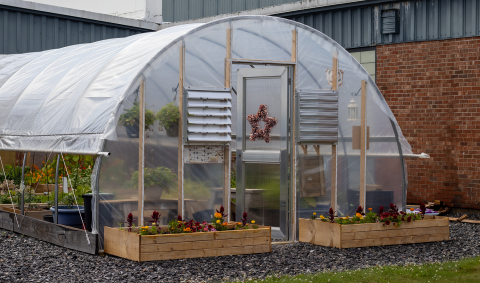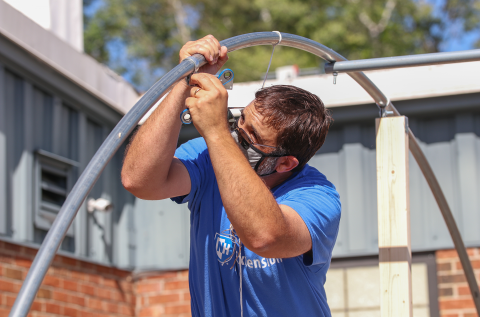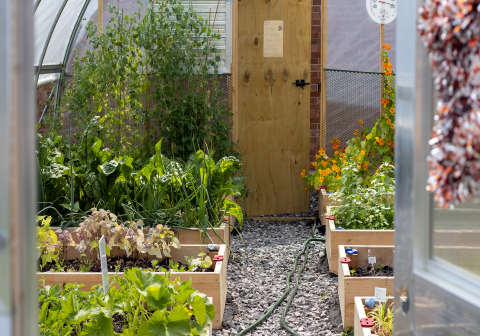Green Thumbs

It was a few weekend construction workshops, hosted by UNH Extension’s Landscape and Greenhouse Field Specialist Jonathan Ebba, that brought to life the structure of a greenhouse at Tilton, New Hampshire’s Winnisquam Middle School in September 2020.
Members of the community, school faculty and Extension staff assisted with the construction project with the aim of bringing active and hands-on growing programs to students at the middle school. The project, which started nearly two years ago, got a boost last summer when special education paraprofessional Sandy Licata got involved. An alumna of Extension’s 2015 Master Gardener class, she reached out to Ebba to organize the September workshop to teach the Winnisquam community how to build a greenhouse.
“We’re really thankful to UNH Cooperative Extension because they’ve done a lot and helped us finish it all up, and their resources and education are so valuable,” Licata says.

When a greenhouse is properly utilized by a school, Ebba says, it can bring forth many important lessons. Along with providing science and industry skills, plants have been shown to have therapeutic benefits for students.
Ebba says the Extension workshop at Winnisquam accomplished three goals. “It provided the middle school with their greenhouse, it taught members of the community how to construct and cover their own greenhouses and it connected people in the community to the middle school through a UNH program.”
Educating Students for the Future
Winnisquam teacher Susan Hewey helped lay the groundwork for a lot of the planning that went into the greenhouse. She’s interested in getting children in the special education program involved to help them expand communication and collaboration skills.
“We have some intervention groups that we do for reading and math,” Hewey says. “I’m hoping to incorporate greenhouse activities with those kids who are reluctant readers and math students. I think it’s going to be really engaging for them.”
At the beginning of the 2020-21 school year, Winnisquam Middle School followed a hybrid model for getting students back into classrooms during the pandemic. While COVID-19 presented setbacks for the greenhouse plans, many teachers are excited to incorporate it into their curricula for the fall of 2021.
It also will provide a nice pipeline to the greenhouse program already in place at Winnisquam Regional High School (students in the high school’s ag center helped construct the metal frame for the greenhouse).
Winnisquam paraprofessional Deb Burley explains that there are a lot of agricultural- focused families in the area and that the pandemic provided time for children to learn more about gardening at home. She hopes that students can take future education from the greenhouse back to their families and eventually into the community.
A Full School Year of Growing
At home, Licata and her family constructed what would become one of the first raised beds installed in Winnisquam’s greenhouse. Teachers and students got to work planting their first round of seeds, including snap peas, kale, onions and more. With donations from the community and a grant from the N.H. Master Gardner Alumni Association, everything started to fall into place.
To care for the beds, Licata established an afterschool garden club in April 2021 to help maintain and water the plants. The group meets twice a week and has even contributed their harvests to the school’s cafeteria. Licata says the plan is to expand the afterschool group into an environmental club with hopes of starting a recycling and composting program.

District food service director Rob Cohen crafted a recipe featuring the dill grown in the greenhouse for the kids to prepare. The school plans to share during morning announcements any time food from the greenhouse will be incorporated into that day’s lunch.
“I want to show people that we’re not just doing your average school lunch. We’re incorporating foods from our gardens,” Cohen says. "When they're given to us, we utilize them.”
Licata says that kids from the school have been able to branch out and try vegetables they claimed they didn’t like, discovering that they actually taste pretty good. Her hope for the future is to keep teaching students through many avenues and maybe even inspiring some to go into different careers related to gardening.
“One of the great things about growing is that it seems like there’s endless possibilities. There’s always something new to learn,” Licata says.